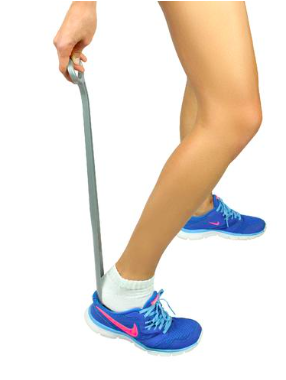Chronic back pain can be an all-too-real affliction of old age, preventing many from getting out of the house, socialising and staying as active as they would hope to. If back pain and soreness are holding you back from living life to the fullest in retirement, check out these expert tips and tricks:
- Stay active: The thought of exercising in pain might seem counter-intuitive, but regular low-impact exercise is especially beneficial for senior citizens who experience back pain. Moderate yet gentle exercises like brisk walks, swimming, and yoga help reduce inflammation, stretch your spine, improve circulation to your back, and strengthen your core.
 Find the right tools: Tools and supplies that can make physical tasks a little easier are a step in the right direction to alleviating back pain. Wearing sensible shoes with proper arch support and a heel less than 1 inch high is proven to support healthy back muscles, and tools like a shoe horn make getting in and out of those shoes much easier. Grabber reaching tools also help prevent back strain by enabling people to pick things up off the ground and around the house without having to bend over.
Find the right tools: Tools and supplies that can make physical tasks a little easier are a step in the right direction to alleviating back pain. Wearing sensible shoes with proper arch support and a heel less than 1 inch high is proven to support healthy back muscles, and tools like a shoe horn make getting in and out of those shoes much easier. Grabber reaching tools also help prevent back strain by enabling people to pick things up off the ground and around the house without having to bend over.
- Keep a watch on the clock: Activities that involve a significant amount of bending over, i.e. gardening or cleaning, should only be done 20 – 30 minutes at a time to prevent straining the back muscles. Improve circulation to the back and prevent injury by standing up, stretching, and walking around.
 Limit screen time: Look at your computer monitor or screen right now. Is your neck craned down to see it? This constant pull on the spine to be staring down at screens, be they computers on our desks or smartphones in our hands, can eventually lead to tense and inflamed neck and back muscles. Sitting down for long periods of time whether watching television or going on the computer also puts a serious amount of pressure on your spine. Doctors recommend practising good posture and getting up from a sitting position every 45 minutes as able to stand and take a short walk. Worried about looking down at your computer screen? Raise the monitor up with a monitor stand or simply by placing it securely on a few stacked books.
Limit screen time: Look at your computer monitor or screen right now. Is your neck craned down to see it? This constant pull on the spine to be staring down at screens, be they computers on our desks or smartphones in our hands, can eventually lead to tense and inflamed neck and back muscles. Sitting down for long periods of time whether watching television or going on the computer also puts a serious amount of pressure on your spine. Doctors recommend practising good posture and getting up from a sitting position every 45 minutes as able to stand and take a short walk. Worried about looking down at your computer screen? Raise the monitor up with a monitor stand or simply by placing it securely on a few stacked books.
- Sleep better: Quality sleep is vital to maintaining a pain-free back and alleviating ongoing back pain. Spine alignment can be achieved with the right position so try sleeping a different way than you usually do to see if that helps. To maintain the natural curve in your spine, try sleeping on your side in the fetal position with a pillow between your knees, on your back with a pillow under your knees, or on your stomach with a pillow under your pelvis.
 Manage stress: Stress and depression can physically manifest themselves in the form of pain, often in the back, shoulders and neck. Talk to your doctor about stress, anxiety management, treating depression, and ways to boost your mental health (and effectively your physical health). Medical treatments, socialising with friends and family, getting a massage, meditation, even therapy can all do their part in alleviating back pain that is associated with stress and/or depression.
Manage stress: Stress and depression can physically manifest themselves in the form of pain, often in the back, shoulders and neck. Talk to your doctor about stress, anxiety management, treating depression, and ways to boost your mental health (and effectively your physical health). Medical treatments, socialising with friends and family, getting a massage, meditation, even therapy can all do their part in alleviating back pain that is associated with stress and/or depression.
- Keep your bones strong: By fighting the onset of arthritis and osteoporosis, senior citizens are also promoting strong spine health. Foods rich in calcium and vitamin D are a natural way to boost bone and back health – add milk, yoghurt, cheese, dark leafy greens, fatty fish, orange juice, or beef liver to your diet to get on the right track.
 Travel lightly: Carrying the same heavy purse on the same shoulder every time you go out? Loading all your groceries into one bag to carry into the house? Lighten the load and distribute the weight to prevent and/or relieve back pain. A rolling cart or bag with wheels makes moving larger loads (like groceries or luggage) easier on your back. And carrying a smaller purse or even just your wallet when you go out instead of a large, heavy bag will prevent the constant pull on your neck and back muscles that cause pain.
Travel lightly: Carrying the same heavy purse on the same shoulder every time you go out? Loading all your groceries into one bag to carry into the house? Lighten the load and distribute the weight to prevent and/or relieve back pain. A rolling cart or bag with wheels makes moving larger loads (like groceries or luggage) easier on your back. And carrying a smaller purse or even just your wallet when you go out instead of a large, heavy bag will prevent the constant pull on your neck and back muscles that cause pain.
Suffering from back pain right now? Consider applying ice packs, heating pads or over the counter muscle creams you find in a drugstore. Chronic back pain can be an indicator sometimes of a more serious, underlying issue, and you should definitely consult a doctor right away for a diagnosis and treatment plan.









Join the Discussion
Type out your comment here:
You must be logged in to post a comment.